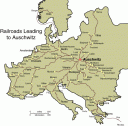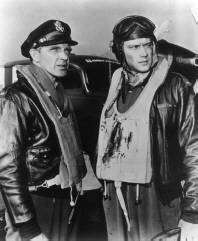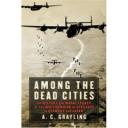Air Power
President Bush’s “Lunge for Legacy Tour” of the Middle East continues. Not content with attempted burnishing of his own record, Bush is reaching back into the past tear down one of the greats, Franklin Roosevelt.
At issue is the age old Auschwitz question, what did Roosevelt do? Or as Secretary Rice summed it up, “the often-discussed ‘Could the United States have done more by bombing the train tracks?.” 
Bush says yes. Others aren’t so sure. The Associated Press quotes a raft of people affirming the would have been usefulness of bombing Auschwitz, most of them not historians.
The literature on this is vast. One place to start is The Myth of Rescue: Why the Democracies Could Not Have Saved More Jews from the Nazis by W. D. Rubinstein. He summarizes the claims made about logistics, prospects and politics of bombing the camps, and concludes that they are myths, myths being used to slander the Allied war leadership.
” In searching for a rational explanation of modern history’s greatest crime, it is important that we not assign guilt to those who were innocent.”
 Bush grew up at a time when “Twelve O’Clock High” was on television, with terse talking bombardiers constantly off to hit ball-bearing plants, returning with barely a scratch. And the madcap antics of Hogan’s Heroes gave further proof of America’s endless pluck.
Bush grew up at a time when “Twelve O’Clock High” was on television, with terse talking bombardiers constantly off to hit ball-bearing plants, returning with barely a scratch. And the madcap antics of Hogan’s Heroes gave further proof of America’s endless pluck.
In reality the Allies had limited resources, which they used with limited results.
The efficacy and morality of the wartime bombing are discussed in Among the Dead Cities: The History and Moral Legacy of the WWII Bombing of Civilians in Germany and Japan by A.J. Grayling 
The post war Strategic Bombing Survey found that even the most energetic and successful bombing had limited effects.
To pull an example from the air, ball bearings:
“The German anti-friction bearing industry was heavily concentrated… approximately half the output came from plants in the vicinity of Schweinfurt….In a series of raids beginning on August 17, 1943, about 12,000 tons of bombs were dropped on this target — about one-half of one per cent of the total tonnage delivered in the air war…[after massive loss of aircraft] Repeated losses of this magnitude could not be sustained …Although there were further attacks, production by the autumn of 1944 was back to pre-raid levels…. there is no evidence that the attacks on the ball-bearing industry had any measurable effect on essential war production.”
And this was in Western Germany, not hundreds of miles East in Poland.
As long as we are playing make believe, why not imagine a world in which American aid to the Soviets was even vaster that it was. In this happy play-war, the millions of Soviet soldiers who died in the campaigns leading to the Soviets liberating the camps never died, but rolled up to the gates in sturdy Ford trucks a year or so earlier.

